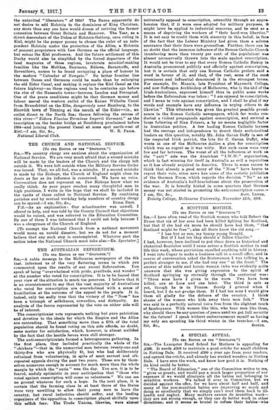THE AUSTRALIAN REFERENDUM.
[To THE EDITOR or euz " SPECTATOR."]
Sra,—A cable message in the Melbourne newspapers of the Cth inst. informed us of the very flattering terms in which you commented upon the results of our recent Referendum. You speak of being "overwhelmed with pride, gratitude, and wonder " at the number who voted for conscription. It is to be feared that your view of the situation is much too generous. I believe that it is no overstatement to say that the vast majority of Australians who voted for conscription are overwhelmed with a sense of humiliation at the outcome of the appeal to the people. It is, indeed, only too sadly true that the victory of the "Noes" has been a triumph of selfishness, cowardice, and disloyalty. An analysis of the forces represented by the vote on either side will be of interest.
The conscriptionist vote represents nothing but pure patriotism and devotion to the ideals for which the Empire and the Allies are contending. That something more than a fifth of the total population should be found voting on this side affords, no doubt, some matter for satisfaction, which, however, is almost nullified by the fact that the hostile forces were still stronger.
The anti-conscriptionists formed a heterogeneous gathering. In the first place, they included practically the whole of the "shirkers "—that is, the unmarried men between twenty-one and thirty-five who are physically fit, but who had deliberately refrained from volunteering, in spite of most earnest and oft- repeated appeals during the past two years. These are by them- selves numerous enough to account for much more than the whole margin by which the "antis " won the day. You are, it is to be feared, unduly optimistic in your anticipation that "those who voted against conscription will come as volunteers." We can see no ground whatever for such a hope. In the next place, it is certain that the farming class in at least three of the States were very unwilling to allow their young men to leave the country, lest rural industries should suffer, and the leading organizers of the opposition to conscription played skilfully upon this selfish fear. The Trade Unions, likewise, were almost universally opposed to conscription, ostensibly through an appro. hension that, if it were once adopted for military purposes, it might later be applied to industrial concerns, and be used as a means of depriving the workers of " their hard-won liberties." It is not easy to credit them with sincerity in this belief, in face of the fact that the Labour Ministry had given the.m a solemn assurance that their fears were groundless. Further, there can be no doubt that the immense influence of the Roman Catholic Church (numbering more than twenty per cent. of the population) was almost unreservedly thrown into the scale against conscription. It would not be true to say that every Roman Catholic Biskop in Australia pronounced publicly and officially against conscription, but it is certain that only one Roman Catholic prelate said a word in favour of it, and that, of the rest, some of the most prominent and influential denounced it in the strongest terms. For example, Dr. Mannix, late President of Maynooth College, and now Suffragan Archbishop of Melbourne, who is the idol of the Irish-Australians, expressed himself thus in public some weeks before the Referendum was taken : "I am opposed to conscription, and I mean to vote against conscription, and I shall be glad if my words and example have any influence in urging others to de likewise." This utterance was given the greatest possible promi- nence in the Roman Catholic newspapers, which for weeks con- ducted a violent propaganda against conscription, and secured a large following of Sinn Feiners, a by no means negligible factor in Australian politics. A few leading Roman Catholic laymen had the courage and independence to desert their ecclesiastical leaders on this question, notably Mr. John Govan Duffy (a eon of the respected Irish patriot, the late Sir C. Gavan Duffy), wise wrote in one of the Melbourne dailies a plea for conscription which was as cogent as it was witty. But such cases were very few and far between. The worst of all the influences at work on the " anti" side was the Anarchist " I.W.W." organization. which is fast winning for itself in Australia as evil a reputation as it has already acquired in America. There is some reason to think that already a good many of the "Noes" have begun to regret their vote, since news has come of the ecstatic jubilation of the German PreAs, which regards the decision "No" as as evidence of Australia's half-heartedness about tho prosecution of the war. It is broadly hinted in some quarters that German money was not stinted in promoting the anti-conscription cause.--.
I am, Sir, &c., A ESL LEEPER. Trinity College, Melbourne University, November 1.71h, 1916.










































 Previous page
Previous page